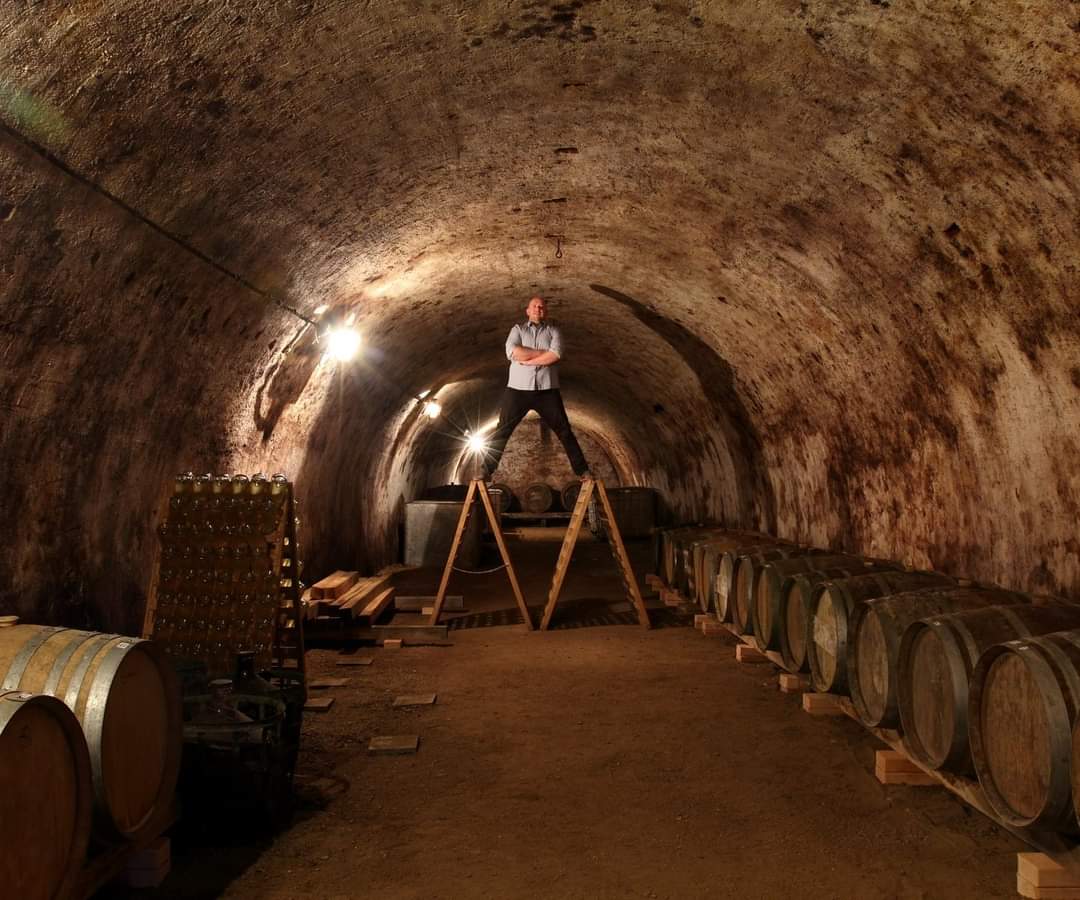PIVNICA ČAJKOV
WINES FROM UNDER THE SITNO VOLCANO. VULCAN WINE. DRINK LONG AND PROSPER.
OWNER AND WINEMAKER: Marek Uhnák
REGION: Slovakia, Region (Nitra), sub region Tekovský, SITNO, Village of Čajkov
The vineyards are located at foothills of southern slopes of Štiavnické Hills
TOTAL HECTARE: 5 ha
ALTITUDE OF VINEYARD(S) - 250 to 400 meters
SOILS: soft tuff - volcanic ash & hard andesite - volcanic lava, region is extremely rich in minerals (apx. 140 mineral varieties)
CULTIVATED: Pesecká Leánka, Fetească Regală, Devin, Pinot Gris, Frankovka, Alibernet
FARMING PRACTICES: Organic
TOTAL ANNUAL PRODUCTION: 20,000 bottles
WINE(S) PRODUCED: sparkling of various techniques, white wines, skin fermented white, flor affected wines and reds. Highly experimental producer.
FIRST COMMERCIAL VINTAGE: 2015
The wines of Pivnica Čajkov are a synthesis of their wildly creative maker, Marek Uhnák, his familial history and the volcanic terroir of Čajkov. They are as inventive as they are classical, as contemplative as they are chuggable, to drink spontaneously or as part of an intricate pairing. The production is based around the old Carpathian variety Pesecká Leánka. While studying wine at Oenology Secondary School in Modra & Mendel University in Brno Marek realized the mistake made in his region where historical grape varieties were replaced with popular international grape sorts. When he returned home to make wine in his familial vineyards his aim became to reverse this trend, not as a matter of taste but because of the unique suitability these localized vines have to their region. “It is not an accident that Pesecká has been so frequent in Čajkov and neighboring villages. Our parents and grandparents understood a long time ago that this wine prospers here; the underlying rock and slopes suit it and it gives good yields even in the worst years. And this is what terroir is about. I have noticed that there are at least four clones of Pesecká only in our Čajkov vineyards and each of them has slightly different characteristics and wines made from them feature different characteristics and qualities in various years. Its flesh is almost liquid with a minimum pectin content, its skin is very thin and fragile and thus it tends to break even upon very careful processing which often shows up as fine tannin in wine. But the fundamental factor is the coexistence with the tuff soil in Čajkov. Pesecká is luxuriant, easily reaches the deeper parts of the underlying rock, draws on its distinctive minerals and blends them into wine. It is able to make use of the ability of tufa to accumulate heat and use it to ripen.”
The soils are the source of the dynamic, mineral aspect all of the wines share. The multitude of volcanic soil types is the result of a large eruption that millions of years ago, reduced a 4,000 meter high mountain to just 400 meters, spreading its interior material across kilometers of land. Greater than a volcano it is a stratovolcano; and one of the largest known volcanic eruptions ever, so large, it influenced climate globally. For millennia the region has been famous for mining of gold and other precious minerals due to its unique geology.
To Merek, nothing is more important than farming. Not only does he care about how he farms, but also his neighbors and their other neighbors. He is strongly opposed to chemical herbicides, pesticides and fungicides. His perspective is that it is necessary for there to be regional movements in the direction of organic if we are to really speak about ecological health. His vineyards are spread over 10 + locations. His ideal locations are completely wild locations surrounded by nature, these he has at higher elevation. Lower vineyards are grown without treatment and he works with neighbors to eliminate chemical treatments from their cultivation practices. Marek farms plots he selects in terms of natural drainage to avoid chemicals and fertilizer runoff entering his vineyards.
“The region is like an organism, you cannot take your wines out of their context, you cannot take the heart from the body and say this is a healthy heart. You can only say this is a healthy body.”
Marek’s wine making is more a response to the variety and harvest rather than a plan to “make” a particular wine. Some of these wines are produced every vintage, others are experiments and one offs. The minerality imparted by the volcanic soils is prominent in all of the wines. It is not a static flavor; it presents itself differently in each wine depending on what the grape variety brings in terms of texture and flavor, and is key to the nuance of all of the wines. In the cellar he is avant garde. Looking into the past and into himself to create modern low intervention wines. Each is made in its own way, sometimes in stainless steel, an assortment of barrels different in size, wood type and age, varying degrees of skin contact, aging under flor. This is not chaos; the wines are vividly individual, faceted, polished and fascinating to pair with international cuisine, the more unexpected the better. The sophisticated cooking Marek does for his family and friends informs the wines he makes.

